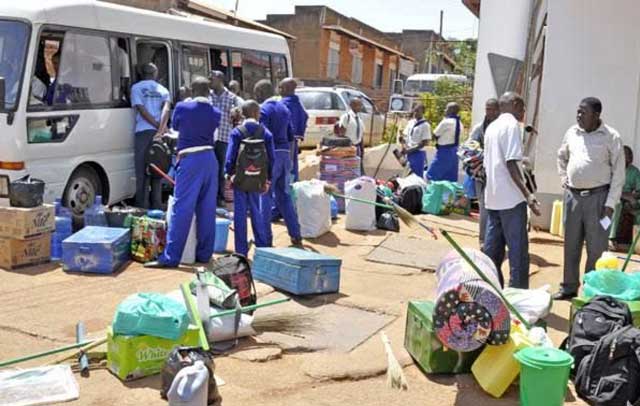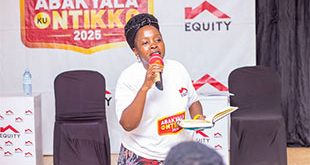
ANALYSIS | THE INDEPENDENT | The effects of the economic hardships which were aggravated by the Ukraine war, coming on the heels of the Covid-19 lockdown continue to manifest in Uganda. Many schools in the country have today registered a low turn-up of learners on the first day of opening.
Even of the fewer students who have turned up, the majority have not paid the full amount of school fees required; in fact many haven’t paid anything yet.
But rather than sending away learners who haven’t paid anything, school administrators have granted grace periods of varying lengths, under the logic that in any case, they will learners will still pay the full amount whether they attend all the term or not.
Of the schools our reporters visited, some have increased school fees, but the government-aided ones have maintained the school fees for the last term while increasing fees for feeding learners.
Some of the public schools denied increasing school fees or feeding fees but parents insisted that they have.For instance in Bujumba County of Kalangala district, Bridge of Hope Primary School and Buswa Primary School have increased feeding fees by 10,000 shillings 30,000 to 40,000 shillings and from shillings 20,000 to shillings 30,000 respectively, to the annoyance of parents.
Lawrence Lwera, the Headteacher of Bridge of Hope Primary School, Kalangala, however, says the school management had no choice but to increase the feeding fees due to high food and fuel prices and also the high transport costs of ferrying foodstuffs and scholastic materials from the mainland districts to Kalangala islands.
Kibanga Primary School, also in Bujumba County, with 700 learners, has increased boarding fees by shillings 20,000 from shillings 240,000 levied the last term.
Mary Josephine Namusisi, the Headteacher at St. Joseph’s Primary School in Entebbe Municipality, says the school decided to charge separate fees for feeding. It is optional since over 70 percent of parents and guardians failed to pay school fees by end of the last term.
With 1,115 learners, parents pay between shillings 26,400 to shillings 34,400 while feeding fees vary for those in lower and upper primary.
Namusisi says the management will however meet parents to discuss the high cost of food items before deciding on whether or not to increase the feeding fees since the government has directed against increasing school fees. By 10 am, 392 of the over 1,000 learners had reported to the school, which Namusisi says is a low turn-up compared to the last two terms.
In Kampala and the rest of the country, schools registered a low turn-up of learners on the first day as a result of parents struggling to make ends meet amidst high commodity prices.
Hadija Nampeera the Deputy Headteacher of Kawempe Muslim Primary school, says the school has today received 200 of the over 800 learners.
Nampeera says the school has been spending over shillings 30 million per term on feeding and given the increasing commodity prices, the school is mooting the possible ways to continue feeding all the learners.
“If it requires reducing the quantity we give our learners that’s what we are going to do, but we must make sure that at least learners are not in class on empty stomach,” Nampeera adds.
Bazirio Kyambadde, the Headteacher of St. Catherine Primary school in Kawempe, says only 12 percent of the 350 learners turned up on Monday.
Kyambadde has said that the school is going to cut off the unnecessary expenses like transportation of learners in the school van because it is expensive for the school yet most parents are against increasing the fees for transporting learners while those who use the school van don’t pay on time.
She adds that the school will feed learners on maize meal known as posho, and beans, “We have to give them posho and beans that can last longer in the stomach,” Kyambadde added.
Musa Kasule of Bastion Secondary school in Nagano says that 150 out of the 350 learners have reported today. Kasule estimates that the school’s feeding budget will increase by over one million shillings from last term’s ten million shillings.
At Nakasero Primary School, the head teacher Rogers Nambuli says 50 percent of their students have turned up. But the teaching has immediately resumed, to make sure that they catch up with the abridged curriculum.
According to Aminah Mukasa Buyinza, the Headteacher of Kololo High School, the school has over 2000 students but 800 subscribe for feeding at school. She says that as the term begins, only 20 out of these 800 students who are fed by the school, have paid the meal fees.
“Normally by the first day, over 500 students of the 800 we feed at School, have already paid for their food and it becomes easier to feed them because food is cheap when we buy it in plenty. Now with the 20 out of 800 we don’t know how it work it out,” she said.
In Olila High School located in Soroti City, some classes had not recorded any students at 10 am when our reporter visited the school. Joseph Opio, Deputy Head Teacher of the School says few learners have turned up at the school because most parents are not able to raise at least half of the 435,000 Shillings required for this term.
Alfred Enyidu, the headteacher of Pioneer Primary School, says only 303 out of 1,237 pupils had reported to the school by Monday morning.
In Mukono, our reporter found that there was a low turnup of learners at some of the government-aided schools namely Bishop East Primary School, Mukono Boarding Primary School, and Mukono High School.
David Buyondo, an administrator at Bishop East Primary School, attributed the low turn-up to financial constraints. He noted that 200 learners out of 1,000 had reported.
Buyondo explained that most learners have returned and come with items such as maize, beans, and banana in exchange for school fees or feeding fees.
He however says the school management has advised parents to sell off these items and send their children back to school with cash.
At Ngandu Primary School, the Head Teacher, Harriet Nabisubi says most of the learners have turned up without requirements such as toilet paper rolls, and brooms and few have paid part of the school fees. She agrees with Buyondo that parents are facing financial challenges in meeting these requirements, which could result in their children reporting late to school.
Suzan Wamala of Mukono Boarding Primary School and also Chairperson for Mukono Diocesan Schools says to make matters worse, government-aided schools have received only half of what they were supposed to get as capitation grants.
As a result, Wamala wants public schools to avoid charging parents for picnics and non-academic activities such as end-of-year parties.
In Kasese, school administrators attribute the very low turn-up of learners to the economic crisis that has hit many parents. They argued that a large section of parents has failed to buy scholastic materials and pay at least partial school fees.
Tarsis Turinawe, a primary P.7 teacher at Kanyangeya Primary School says that despite being government-aided and parents just paying a small PTA contribution, many parents told him that they could not send their children to school on Monday because they don’t have money to buy basic items such as books.
He equally noted that a number of other children are usually engaged in odd jobs during holidays in order to acquire school contributions and these normally come to school a week or two after the opening date. Only six learners out of 36 were present in primary seven on Monday.
The deputy head teacher at Crimson Primary School, Swalleh Masereka, says despite not increasing the fees, most of the parents have not sent their children to school on the first day of this term because they cannot afford to meet other school requirements whose prices have gone so high. He envisages a situation where schools will be forced to increase fees despite government directives.
Joseph Guti, the Deputy Headteacher at Chadwick Namate Primary School, Entebbe, says the school will hold a meeting with parents and other stakeholders on how best to cope with the increasing commodity prices before increasing school fees or feeding fees.
Guti noted that 300 out of the 550 learners had reported on the first day. He added that the school has not increased the school fees which range from 87,500 to 103,500 shillings.
Marion Muhindo, the headteacher of Mujama Daycare and Nursery School, says that whereas the administrators are aware of parents’ challenges, the schools expect them to make some contributions before learners come to class.
Parents ReactMoreen Mbambu, a parent at Kasese Muslim Primary School told URN that her two daughters would not report on the first day of the time because she needed more money to buy books and a new uniform.
In Lango, parents are concerned that schools made increments on not only school fees but also other requirements without consulting parents. Bernard Opio, a parent of a primary six pupil at Amackide primary school in Otuke District, argues that schools levy fees on parents but the money is never put to good use.
****
URN
 The Independent Uganda: You get the Truth we Pay the Price
The Independent Uganda: You get the Truth we Pay the Price



